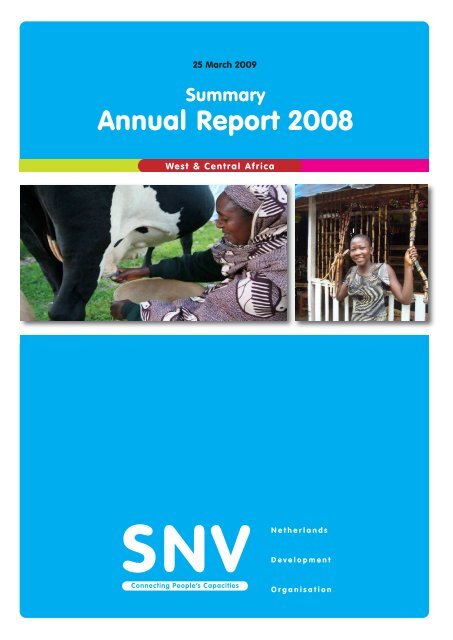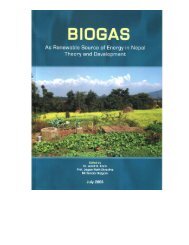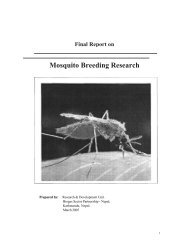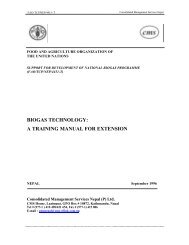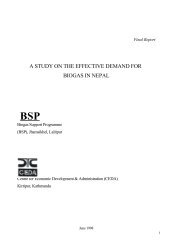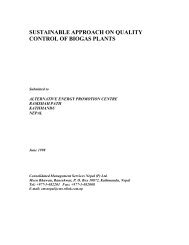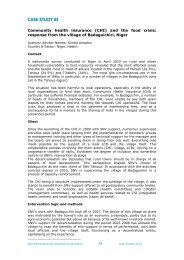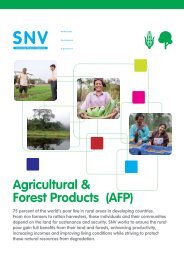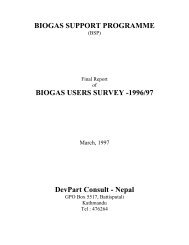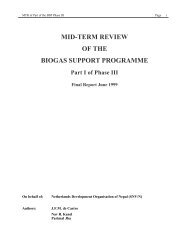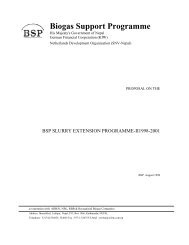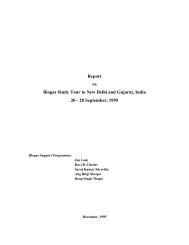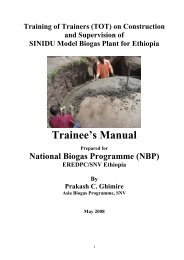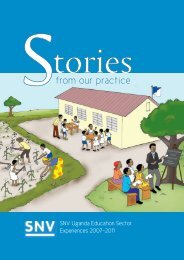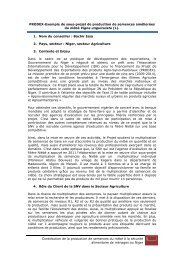download (pdf, 3MB) - SNV
download (pdf, 3MB) - SNV
download (pdf, 3MB) - SNV
Create successful ePaper yourself
Turn your PDF publications into a flip-book with our unique Google optimized e-Paper software.
25 March 2009<br />
Summary<br />
Annual Report 2008<br />
West & Central Africa<br />
<strong>SNV</strong><br />
Connecting PeopleÊs Capacities<br />
N e t h e r l a n d s<br />
D e v e l o p m e n t<br />
O r g a n i s a t i o n
Summary Annual Report 2008 2<br />
Summary Annual Report<br />
List of contents<br />
1. Foreword<br />
2. About <strong>SNV</strong> West & Central Africa<br />
3. Challenges in our region<br />
4. Highlights of 2008<br />
5. Strategy<br />
6. Finance<br />
7. Partnerships & Funding<br />
8. Human Resources<br />
Annex: Examples of our work<br />
I Case Cameroon<br />
II Case Mali<br />
III Case Niger<br />
<strong>SNV</strong> West & Central Africa
Summary Annual Report 2008 3<br />
1. Foreword<br />
Strengthened capacity for positive<br />
change in West & Central Africa<br />
A number of recent successes demonstrate<br />
that rapid progress is possible<br />
across Africa when sound national programmes<br />
are matched with good governance,<br />
dynamic local leadership,<br />
adequate development assistance and full<br />
technical support.<br />
These tasks have now become more challenging<br />
since we face a global economic<br />
slowdown and a food security crisis, both<br />
of uncertain magnitude and duration. Climate<br />
change has also become a major<br />
concern. These developments will directly<br />
affect our efforts to reduce poverty: the<br />
economic slowdown will diminish the incomes<br />
of the poor, the food crisis will increase<br />
the number of hungry people in<br />
the world and push millions more into poverty,<br />
and climate change will have a disproportionate<br />
impact on the poor,<br />
especially in Saharan countries. However,<br />
this could also be an opportunity for<br />
Africa to boost her regional markets. The<br />
recent meetings of the West African Economic<br />
and Monetary Union and the Economic<br />
Community of West African States<br />
(ECOWAS) mentioned this opportunity.<br />
The midterm evaluation of the global effort<br />
to achieve the Millennium Development<br />
Goals by 2015 shows already that<br />
many WCA countries are having problems<br />
achieving the goals set. All this presents<br />
us with a real challenge of sharing a vision<br />
in order to be able to act collectively<br />
in fighting these crises within our competencies.<br />
As we confront these new challenges, our<br />
strategy remains to keep our focus on increasing<br />
access to good basic services<br />
(such as primary education, primary<br />
health care and sanitation) and increasing<br />
income and employment opportunities.<br />
At the same time we need not to<br />
forget matters such as governance for<br />
empowerment, domestic accountability<br />
and gender equality.<br />
Supporting relevant stakeholders in identifying<br />
the actions and policies needed to<br />
respond to these and other multifarious<br />
and interlinked development challenges is<br />
at the heart of <strong>SNV</strong>’s work.<br />
As this year’s Annual Report details, we<br />
do this by developing the capacity of<br />
men, women and institutions to improve<br />
lives and accelerate change in their environment.<br />
This report highlights the relevance of our<br />
work. It outlines how <strong>SNV</strong> is focusing its<br />
support on increasing access to good<br />
basic services (BASE) and increasing production,<br />
income and employment opportunities<br />
(PIE). Alongside the two impact<br />
areas PIE and BASE we focus on Governance<br />
for Empowerment and sustainability.<br />
Through these and other activities,<br />
and in close collaboration with other partners<br />
such as the Embassy of the Kingdom<br />
of the Netherlands, <strong>SNV</strong> WCA remains<br />
committed to supporting countries in<br />
their efforts to help build a better life for<br />
their people by connecting people capacities.<br />
Hans van der Graaf, Regional Director<br />
<strong>SNV</strong> West and Central Africa<br />
<strong>SNV</strong> West & Central Africa
Summary Annual Report 2008 4<br />
2. About <strong>SNV</strong> West & Central Africa<br />
<strong>SNV</strong>-Netherlands Development Organisation<br />
reinforces local organisations to reduce<br />
poverty by giving advice on<br />
economic development and basic needs<br />
services like health and education. We<br />
work with, and through, local organisations<br />
to reach out to poor people. Our aim<br />
is that these people should have easier<br />
access to high quality education and<br />
health and water and sanitation services.<br />
In addition, we want them to be able to<br />
generate production, income and employment<br />
opportunities for their activities and<br />
create more wealth for themselves, their<br />
family and community.<br />
In 32 countries worldwide, our 800 largely<br />
local advisors are on the ground to<br />
listen, connect, advise, facilitate and exchange<br />
expertise. We serve 2,500 clients<br />
in the public sector, private sector and<br />
civil society in five geographic areas:<br />
Asia, the Balkans, East and Southern<br />
Africa, West and Central Africa, and Latin<br />
America. Our support staff is responsible<br />
for development of content knowledge,<br />
Human Resources, and Finance to support<br />
<strong>SNV</strong>’s core advisory business.<br />
<strong>SNV</strong> has been active in West and Central<br />
Africa for over 40 years. We are well<br />
known in the region as a key partner for<br />
local authorities and other actors involved<br />
in decentralisation processes. We focus<br />
our efforts on education, health,<br />
energy/biogas, water & sanitation, agriculture<br />
including cotton, livestock, forestry<br />
and tourism. Working in eight<br />
countries with 33 teams from 28 offices<br />
and with more than 260 local and international<br />
advisors, working hand in hand<br />
with local actors, we have a positive impact<br />
on the living conditions of 10 million<br />
people.<br />
<strong>SNV</strong> does not act on its own. We work together<br />
with local NGO’s who, like <strong>SNV</strong>,<br />
focus on supporting local actors in their<br />
fight against poverty. At the same time,<br />
<strong>SNV</strong> has strong and fruitful partnerships<br />
with a wide array of civil society and private<br />
organisations, farmers associations<br />
and local governments. This network is<br />
used to tackle specific local, national and<br />
regional (or even global) issues together<br />
with clients and partners. The Ministry of<br />
Foreign Affairs of the Netherlands is a key<br />
strategic partner and one of the main donors<br />
that finance the services of <strong>SNV</strong>.<br />
With the support of external donors, the<br />
local organisations that receive advice<br />
from <strong>SNV</strong> do not have to pay for our services.<br />
With our motto “Connecting people’s<br />
capacities” in mind, we are actively<br />
engaged in finding other partners, such<br />
as development institutions and funders,<br />
who can complement us in our development<br />
work and accelerate its impact.<br />
<strong>SNV</strong> WCA currently operates in Benin,<br />
Burkina Faso, Cameroon, DR Congo,<br />
Ghana, Guinea Bissau, Mali and Niger.<br />
Our sharp gender profile and our capacity<br />
to bring different actors together have<br />
proven to be powerful tools for enhancing<br />
development. Next to that, by providing<br />
high quality advisory services and technical<br />
support, we help local organisations<br />
find a practical path to development. In<br />
this annual report you will find many<br />
examples from West and Central Africa.<br />
<strong>SNV</strong> West & Central Africa
Summary Annual Report 2008 5<br />
3. Challenges in our region<br />
2008 has been characterised by the consequences<br />
of the overall rise of prices for food<br />
and petroleum products. Rising prices and<br />
speculation in diverse products made it clear<br />
that agriculture was acquiring a new place in<br />
the world economy. This was a major cause<br />
for the energy and food crises in many poor<br />
countries (with f.i. riots in Burkina Faso,<br />
Niger and Cameroon).<br />
As a result, almost all states and regional<br />
institutions have resorted to two types of<br />
measures: emergency responses aimed at<br />
reducing the rise of food prices, and short or<br />
long term measures aimed at increasing the<br />
national production of staple food. Different<br />
incentives were adopted by the states: subsidy<br />
for inputs (fertilizers and seeds), seasonal<br />
credit allocation, basic development of<br />
agricultural lands, a promise to collect products,<br />
and possible State-guaranteed prices<br />
(in the case of rice in Burkina Faso and<br />
Benin, and cowpeas in Niger).<br />
Regional and international institutions have<br />
taken measures to support state initiatives.<br />
The Economic Community of West African<br />
States (ECOWAS) has devised a regional offensive<br />
for food production and hunger<br />
control by seeking consistency amongst national<br />
programmes at the regional level and<br />
by harmonizing the short term response<br />
with the region’s long term agricultural policy<br />
(ECOWAP).<br />
In addition to the general food crisis, there<br />
has been the ambiguous situation of the cotton<br />
sector. In 2008 there was a significant<br />
reduction of land under cotton cultivation;<br />
there was an increase in input prices, resulting<br />
in a less profitable cost/benefit ratio.<br />
Since cotton chain services (finances, inputs,<br />
transport and extension) sustain other products<br />
of farming households, the hampering<br />
cotton engine affected other chains (cereals,<br />
livestock, oil seeds and niche-market bio<br />
cotton) and even national food security in<br />
Mali, Burkina Faso and Benin. Maintenance<br />
of sustainable cotton-staple food production<br />
and of viable industries is a main concern for<br />
national governments, which have reacted<br />
to the situation by giving subsidies and<br />
loans to chain stakeholders and by recapitalising<br />
companies.<br />
Despite the adverse effects of global climate<br />
change, the current agricultural production<br />
season (2008/2009) in the Sahelian countries<br />
indicates abundant production levels for<br />
a wide variety of crops. Fortunately, the<br />
rainy season was rather good this year. However,<br />
some pastoral areas have had less<br />
than average rainfall which has led to<br />
change of mobility of pastoral herds and increased<br />
pressure on pastoral resources in<br />
other areas.<br />
Another challenge is the global economic<br />
slowdown of uncertain magnitude and duration.<br />
The economic slowdown will diminish<br />
the funds available for developing countries<br />
and other above mentioned developments<br />
will directly affect our efforts to reduce poverty.<br />
All agricultural chains have been affected by<br />
the rising petrol prices and the widespread<br />
rise of global prices for food, which could be<br />
a burden on their competitiveness. At the<br />
same time this context of new demands<br />
creates opportunities for all agricultural products.<br />
The expectations are that prices will<br />
rise in 2009-2010. Most countries will adapt<br />
their agricultural policies and investments.<br />
Farmers, processors and local traders will<br />
now need, more than ever, the right skills to<br />
be able to respond to the new demands and<br />
markets.<br />
Furthermore the process of decentralisation<br />
and harmonisation continues in Mali, Burkina<br />
Faso, Benin and Niger. Some countries (namely<br />
Niger and Benin) are finding this process<br />
problematic, due to a lack of, or slow<br />
transfer of, competencies. The political climate<br />
seems stable in Mali, Ghana, Cameroon<br />
and Guinea Bissau. Niger has a<br />
relatively unstable political situation because<br />
of the increasing insecurity in the northern<br />
part of the country. In addition, there have<br />
been various armed aggressions in the Gao<br />
area of Mali, but it is unclear whether this is<br />
related to a political conflict or to traffic and<br />
banditry. Despite the resurgence of political<br />
and military troubles in the eastern part of<br />
the country in October 2008, DR Congo has<br />
continued its normalization process throughout<br />
the year. Only at the end of 2008 did<br />
the international economic crisis start to<br />
have a huge impact on the export revenues<br />
of raw materials leading to a quick rise of inflation.<br />
Until late 2008, the political context<br />
in Guinea Bissau was characterised by institutional<br />
instability with several changes in<br />
government. The newly installed government<br />
of December 2008 has the task of revitalising<br />
the decentralization process.<br />
<strong>SNV</strong> West & Central Africa
Summary Annual Report 2008 6<br />
4. Highlights of 2008<br />
Achievements<br />
We have seen results in the practice areas<br />
we focus on - education, health,<br />
energy/biogas, water and sanitation, agriculture,<br />
cotton, livestock, forestry and<br />
tourism. One example is Guinea Bissau,<br />
where <strong>SNV</strong> helped to create a business<br />
environment for fair exchange exports in<br />
the cashew sector. This enabled producers<br />
to sell a kilogramme of raw cashew nuts<br />
for EUR 0.56/kg instead of the previous<br />
cashew price of EUR 0.23/kg. Sixty-two<br />
producer groups and fifteen processor<br />
units were trained, 130,000 tons of cashew<br />
nuts were exported, and the government<br />
earned about EUR 40,000,000 from<br />
export taxes. Around 250,000 families benefited<br />
directly from this result.<br />
2008, a total of 571,783 children have<br />
been fed, representing 20% of all public<br />
primary school children in the country,<br />
with an increase in enrolment of 12.8%.<br />
From 2009, NGO/CSO will be represented<br />
on the Project Steering Committee (PSC),<br />
the highest decision-making body of the<br />
GSFP.<br />
In the cotton sector, the contribution of<br />
<strong>SNV</strong> Burkina Faso to the Farm Management<br />
System improved the situation of<br />
15,000 producers This is about 15% of all<br />
the producers in the <strong>SNV</strong> intervention<br />
area, covering one-third of the whole cotton<br />
area; 25% more than in 2007. The<br />
Farm Management System leads to higher<br />
farm revenues through better production,<br />
planning and marketing. In 2009, there<br />
will be further scaling up and an institutionalising<br />
of the Farm Management System<br />
in Burkina, as well as in Benin and Mali.<br />
By employing a multi-stakeholder approach<br />
to its engagement with the Ghana<br />
School Feeding Programme (GSFP), <strong>SNV</strong><br />
Ghana facilitated dialogue, information<br />
sharing and participation among government<br />
and non-governmental/civil society<br />
organisations (NGO/CSO). Subsequently,<br />
the programme has been improved, the<br />
number of schools with potable water has<br />
increased from 50% in 2007 to 65% in<br />
2008; sanitation facilities have increased<br />
from 50% in 2007 to 75% in 2008 and the<br />
amount spent on daily feeding has increased<br />
from about 25 USA cents to about 33<br />
USA cents per child. Since December<br />
<strong>SNV</strong> West & Central Africa
Summary Annual Report 2008 7<br />
Highlights of 2008<br />
The partnership between <strong>SNV</strong> WCA and<br />
Fair Trade Labelling Organisation (FLO)<br />
increased opportunities (in 2007/2008)<br />
for <strong>SNV</strong> clients to access Fair Trade markets.<br />
This was evidenced by the growth in<br />
sales of Fair Trade products and by the<br />
increasing number of <strong>SNV</strong> clients applying<br />
for Fair Trade certification. In addition,<br />
the partnership has assisted groups<br />
to manage the Fair Trade premium more<br />
effectively, and training sessions on leadership<br />
and management skills have improved<br />
the groups’ organisational<br />
efficiency and management. After a<br />
constructive meeting in September 2008<br />
in Accra, Ghana, four countries in the region<br />
(Ghana, Benin, Burkina Faso, and<br />
Mali) renewed and strengthened their engagements<br />
with FLO to access markets<br />
for mango, cashew, and shea nut.<br />
<strong>SNV</strong> Benin supported municipalities in establishing<br />
effective household waste and<br />
management systems, in collaboration<br />
with other actors including women’s associations.<br />
In addition, municipalities<br />
strengthened their financial capacities by<br />
implementing local tax mobilisation strategies.<br />
<strong>SNV</strong> Benin’s contribution to the<br />
improvement of the drinking water supply<br />
and sanitation infrastructure resulted in<br />
increased access to drinking water for the<br />
population in rural areas from 45% in<br />
2007 to 51% in 2008.<br />
Some cross-regional partnerships also led<br />
to tangible achievements. One such partnership<br />
is that between <strong>SNV</strong> WCA and action-research<br />
organisation Laboratoire<br />
Citoyennetés. This collaboration resulted<br />
in improved delivery of local public services<br />
in 4 countries, 124 villages and for<br />
133.013 people. In addition 34 new administrative<br />
centres were created, making<br />
it easier for people to register their<br />
children after birth and giving them more<br />
access to health, water and education<br />
(not being registered at birth can mean<br />
one has no access to education). New<br />
local resources were also sought out to<br />
improve the delivery of drinking water<br />
and to build 3 new hospital rooms and<br />
provide equipment for 3 health centres.<br />
Within the framework of the cross-regional<br />
partnership between <strong>SNV</strong> WCA and<br />
Millennium Development Goal centre, a<br />
strategy has been devised to enlarge the<br />
Millennium Villages Programme (MVP) within<br />
the national framework, contribute to<br />
the formulation of more MVPs (e.g. initiative<br />
166 communes in Mali), integrate<br />
gender strategies into MVPs and increase<br />
potential for community development in<br />
countries which have the MVP.<br />
The regional partnership between <strong>SNV</strong><br />
WCA and the United Nations Development<br />
Programme continued in Niger, Mali,<br />
Benin, Burkina Faso and Cameroon. The<br />
joint efforts are aimed at achieving tangible<br />
results in basic services delivery, income<br />
generation, and job creation by<br />
supporting capacity development and resource<br />
mobilisation.<br />
<strong>SNV</strong> West & Central Africa
Summary Annual Report 2008 8<br />
5. Strategy<br />
Executive summary<br />
Evolution in strategy<br />
In 2008 we put major effort into working<br />
with experienced Local Capacity Builders<br />
(LCBs) 1 . Our ambition to stimulate the<br />
enabling environment and work strongly<br />
with LCBs as clients, sub-contractors and<br />
partners is becoming part of the ‘<strong>SNV</strong><br />
brand’: our way of achieving lasting development<br />
results. Our ambition to help<br />
improve the environment for local capacity<br />
development is one of the most essential<br />
developments in our corporate<br />
strategy. Local capacity builders are a<br />
vital resource for effective and sustainable<br />
local development. In 2008, <strong>SNV</strong><br />
WCA put major effort into helping improve<br />
the environment for local capacity<br />
development. As a result, most WCA<br />
countries are coaching experienced LCBs<br />
and are working together with them, with<br />
the final goal that specific tasks from <strong>SNV</strong><br />
can be taken over by them. Our services<br />
to LCBs include a training module that<br />
ranges from relatively simple training on<br />
specific operational issues (financial management,<br />
planning, HRM) to more complex<br />
organisational development.<br />
1 For <strong>SNV</strong> a local capacity builder (LCB) is any type<br />
of actor that provides capacity development services<br />
to intermediate-level actors in order to reduce<br />
poverty, and is owned and run within the country<br />
or regional context.<br />
Sector Choices<br />
In 2008 there were no major deviations<br />
from the WCA Regional Strategic Plan<br />
2008-2009. Our sector choices remained<br />
the same: education, water and sanitation,<br />
hygiene (WaSH), primary Health,<br />
and biogas sectors for increasing access<br />
to good basic services and the sectors<br />
agriculture, livestock, cotton, timber forest<br />
products, non timber forest products<br />
(NFTP) and tourism for increasing production,<br />
income and employment opportunities.<br />
In 2008 we started a roadmap to prepare<br />
ourselves for the new planning period<br />
2010-2012. Part of the procedure is an<br />
analysis of our sectors and interventions.<br />
With this instrument we are able to make<br />
more accurate decisions on sector<br />
choices and intervention zones. This will<br />
help us to estimate costs and compare<br />
them with tangible results.<br />
Becoming a knowledge organisation<br />
In 2008 we undertook efforts to maintain<br />
and develop the quality of our knowledge<br />
management. To this end, we established<br />
sector based knowledge networks to<br />
bring all regional knowledge together.<br />
Development needs were identified with<br />
the help of an inventory. The knowledge<br />
<strong>SNV</strong> West & Central Africa
Summary Annual Report 2008 9<br />
Strategy<br />
networks in specific fields are open platforms<br />
in which our advisors, leading<br />
clients, external expertise centres and<br />
professionals take part. Our knowledge<br />
brokering activities aim to enable local<br />
organisations and LCBs to access, apply<br />
and continuously renew their knowledge.<br />
During the course of these activities we<br />
exchanged, and consolidated our experiences<br />
and knowledge for the benefit of<br />
our clients, partners, colleagues and<br />
other actors (within and between sectors).<br />
Our efforts are in line with our ambition<br />
to become a true knowledge<br />
organisation.<br />
Repositioning and internal learning<br />
improve the quality, coherence and effectiveness<br />
of our services, we conducted<br />
various training, information and coaching<br />
sessions with management, portfolio<br />
teams and knowledge networks on, for<br />
example, Managing for Results and Governance<br />
for Empowerment. In 2009<br />
these processes will be fully implemented<br />
and integrated.<br />
Internal situation<br />
Whilst the first part of 2008 was largely<br />
devoted to aligning our organisational<br />
structure and our client portfolio with our<br />
strategic ambitions, it also provided<br />
strong foundations for increasing the<br />
quality and impact of all our work. The<br />
transition went smoothly and advisors<br />
rose to the challenge of changing teams<br />
and, sometimes, sectors. The shifting and<br />
mixing of staff encouraged further thematic<br />
cooperation across teams and<br />
contributed to the overall ‘one <strong>SNV</strong>’ that<br />
we have become. Especially in DR Congo,<br />
2008 was a year of transition. At the end<br />
of 2007, the Board of Directors decided<br />
formally to invest in DR Congo as a full<br />
country program. In 2008 the first steps<br />
were taken to implement this decision.<br />
Operational plans were finalised and actor<br />
constellations were designed as a basis<br />
for client engagement. We achieved results<br />
both in terms of enhanced client<br />
performance and the creation of an enabling<br />
environment. The impact of our<br />
practices is more difficult to assess. To<br />
sharpen the focus of our advisory practices,<br />
and to create a sound framework<br />
for result management, we will invest<br />
more in elaborating adequate baselines<br />
and results chains, and applying regular<br />
and effective monitoring.<br />
Internally, all countries went through a<br />
repositioning exercise. The number of<br />
teams was reduced in Benin, Cameroon,<br />
Mali and Burkina Faso. At the same time,<br />
thematic groups were formed across<br />
teams, based on sector choices. This matrix<br />
structure stimulates closer collaboration<br />
between and within sectors, leading<br />
to greater coherence, knowledge sharing,<br />
efficiency and possibilities to scale up. To<br />
<strong>SNV</strong> West & Central Africa
Summary Annual Report 2008 10<br />
6. Finance<br />
There have been significant personnel<br />
movements in 2008 with several new Finance<br />
Officers joining the team. Despite<br />
the changes, the Finance unit (which includes<br />
Administration, Business Analysis,<br />
Business Process Management, ICT, Procurement<br />
and Logistics) has achieved<br />
many of its objectives:<br />
• Administration: the objective to adjust<br />
the administration system to facilitate<br />
matrix organisation and Partnership Resource<br />
Mobilisation requirements has not<br />
yet been fully implemented.<br />
• Planning & Control: an improved Management<br />
Information System reporting is<br />
supporting Business Management Awareness<br />
and result oriented management.<br />
• Procurement & Logistics: central ICT<br />
purchases are in place which result in,<br />
and support, cost reduction. There is<br />
also ongoing evaluation of procurement<br />
contracts to identify possible cost reductions.<br />
• Internal Control & Audit: improvements<br />
have been made in the auditing process.<br />
• The Business Process Management<br />
(BPM) initiative will significantly contribute<br />
towards these objectives. BPM looks<br />
at simplification and harmonization and<br />
introducing more accountability.<br />
Overall the 2008 Finance Key Quantitative<br />
Indicators for the WCA region were<br />
satisfactory:<br />
• ICT: the improvement of internet<br />
connectivity is ongoing.<br />
<strong>SNV</strong> West & Central Africa
Summary Annual Report 2008 11<br />
7. Partnerships & Funding<br />
Strategic Partnerships<br />
To effectively deliver results, <strong>SNV</strong> West<br />
and Central Africa focused on building<br />
high impact strategic partnerships.<br />
Several countries in the region developed,<br />
or maintained, close collaboration with<br />
the Embassy of the Kingdom of the Netherlands<br />
(EKN).<br />
<strong>SNV</strong> Benin and <strong>SNV</strong> Ghana are two of the<br />
five pilot countries experimenting with<br />
the domestic accountability programme.<br />
<strong>SNV</strong> Ghana is piloting the implementation<br />
of Local Capacity Development Fund<br />
(LCDF) (The introduction of this fund by<br />
<strong>SNV</strong> is an innovative initiative to stimulate<br />
a local market for capacity development<br />
services. The LCDF channel will expand<br />
over time to stimulate the emergence<br />
of a local market for<br />
demand-oriented capacity development<br />
services to local actors. The funds will be<br />
developed with local and international actors,<br />
so they will become self-sustaining<br />
and primarily locally/regionally owned).<br />
Regional partnerships with United Nations<br />
Development Programme (UNDP), Fair<br />
Trade Labelling Organisation (FLO), action-research<br />
organisation Laboratoire Citoyennetés,<br />
Royal Tropical Institute (KIT),<br />
and Millennium Village programme continued.<br />
<strong>SNV</strong> West & Central Africa
Summary Annual Report 2008 12<br />
Partnerships & Funding<br />
With regard to external funding, <strong>SNV</strong><br />
WCA forged several financial partnerships<br />
and received in total 2,581.000 Euros<br />
(not including the funding from our main<br />
partner the Ministry of Foreign Affairs of<br />
the Netherlands). <strong>SNV</strong> Niger received external<br />
financial resources from the Swiss<br />
cooperation, the Danish cooperation<br />
through DED and USAID through Mercy<br />
Corps and UNICEF. The funds with a total<br />
value of 240,000 Euros assisted in enabling<br />
better integration of Millennium<br />
Development Goals in local development<br />
planning and some investments at municipal<br />
level.<br />
<strong>SNV</strong> Mali has entered into two financial<br />
partnerships in 2008. One is the second<br />
phase for the SIDA programme worth<br />
1,495.056 Euros over two years. With<br />
this programme we aim to improve local<br />
governance in cotton and livestock. For<br />
this we are working in partnership with<br />
the Swiss Association for International<br />
Cooperation (Helvetas), Norwegian evangelical<br />
aid (AEN) and Christian Development<br />
Organisation (Diakonia). The other<br />
one is related to decentralisation and<br />
transfer of competences for primary<br />
health care and primary education. The<br />
Embassy of the Kingdom of the Netherlands<br />
(EKN) is financing the Malian Association<br />
of Municipalities. <strong>SNV</strong> will supply<br />
advisory services and will mobilise<br />
207,635 Euros for Primary Process related<br />
activities.<br />
<strong>SNV</strong> Guinea Bissau mobilised about<br />
162,846 Euros with the Spanish Cooperation<br />
and Plan International Guinea Bissau.<br />
The funds were used for income generating<br />
activities to support basic education<br />
and for community development planning.<br />
There is still space for improvement on<br />
partnerships and resource mobilisation.<br />
We are hoping that, in the coming years,<br />
all partnerships will really focus on the results<br />
to be achieved in our selected sectors.<br />
In addition, each regional/corporate<br />
partnership will have a regional focal<br />
point to monitor progress.<br />
We are actively engaged in finding other<br />
partners such as development institutions<br />
and funders who can complement us in<br />
our development work and accelerate its<br />
impact.<br />
Are you interested in becoming a partner<br />
of <strong>SNV</strong>? Or would you like further information?<br />
Please contact Brigitte Dia, our<br />
regional strategy advisor at<br />
bdia@snvworld.org
Summary Annual Report 2008 13<br />
8. Human Resources<br />
In 2008, the Human Resources team<br />
moved towards recruiting and developing<br />
the capacities of our national teams.<br />
There was significant progress and achievement<br />
in the following areas:<br />
• Clearer job descriptions were devised<br />
for advisors with an ongoing project to do<br />
the same for support and office staff.<br />
• A 6% increase in gender balance goals.<br />
• Significant recruitment of new team<br />
members to the Regional Office Staff, including:<br />
the Regional Director, Regional<br />
Controller, Business Process Manager, Regional<br />
Communication Officer, HR Officer,<br />
Business Analyst, and Head of Administration.<br />
• Solid progress in the decentralisation of<br />
the national and international recruitment<br />
process at the respective country levels,<br />
with support as requested from the regional<br />
office.<br />
• Movement towards the implementation<br />
of the compensation and benefits philosophy<br />
with a restructuring of salary scales<br />
and benefits in countries in West and<br />
Central Africa.<br />
• A good number of <strong>SNV</strong> countries reviewed<br />
and updated their county security<br />
plans.<br />
• An Advisor Learning Program was implemented<br />
in the region.<br />
Overall the region grew modestly in staffing<br />
with an overall increase of just over<br />
five percent. The table below summarizes<br />
this.<br />
Interested in working for <strong>SNV</strong>?<br />
Working for <strong>SNV</strong> can be challenging, rewarding and inspiring – all at the same time.<br />
We are always looking to employ committed and experienced people to help us make<br />
a real difference to the lives of poor and marginalised people in developing countries.<br />
Are you looking for an attractive job with competitive rates, one that's worth getting<br />
up for in the morning? You might just find it here. Look for the recent job openings on:<br />
www.snvworld.org.<br />
<strong>SNV</strong> West & Central Africa
Summary Annual Report 2008 14<br />
Annex : Examples of our work<br />
Below are three cases which give insight into our advisory work on economic development and<br />
access to basic needs services.<br />
I Case Cameroon<br />
Baka Pygmies as Equal Business Partners<br />
Equitable involvement in commercialising non<br />
timber forest products<br />
Context: The dense, tropical forests of southern<br />
Cameroon contain a stunning variety of<br />
hardwood trees, animals such as gorillas and<br />
antelopes, and so-called non timber forest<br />
products (NTFPs) such as fruits, nuts, mushrooms,<br />
medicinal plants and barks, edible<br />
leaves and honey.<br />
These forests also constitute a survival base<br />
for around 7 million men and women. The<br />
contribution of NTFPs to annual household income<br />
ranges between 30-100%. Large portions<br />
of forest have practically become off<br />
limits to these people because of closely<br />
guarded logging concessions that can easily<br />
last a quarter of a century.<br />
Increased population pressure, diminishing<br />
access to resources, but also diminishing biodiversity<br />
due to forest exploitation, are compounding<br />
the problems of daily survival. This<br />
is especially true for the 3,500 Baka pygmies,<br />
whose distinct culture and total economic,<br />
cultural, and also spiritual dependence on the<br />
forest make them especially vulnerable. Coupled<br />
with historic discrimination, the Baka<br />
score even lower than their poor Bantu neighbours<br />
on issues such as life expectancy<br />
(around 40), education (no one has ever reached<br />
university), employment and income.<br />
There are no exact figures but very few Baka<br />
have a stable job or practice agriculture and<br />
products sold by the Baka generally sell far<br />
below the market price or are simply exchanged<br />
for cigarettes or alcohol.<br />
What has <strong>SNV</strong> done? <strong>SNV</strong> conducted an initial<br />
mapping of the entire value chain of<br />
NTFPs and its various players, ranging from<br />
the producers in the forest to the buyers,<br />
transporters, wholesalers and exporters, but<br />
also the government officials involved in taxation<br />
and control. <strong>SNV</strong> was the first organisation<br />
to realise that the Baka were by far the<br />
largest producers of NTFPs in the South (responsible<br />
for over 70% of production), and<br />
that Nigeria was by far the biggest market<br />
(with roughly 80% of the market share) and<br />
desperately demanding more. <strong>SNV</strong> decided to<br />
Grouped sale by Baka Pygmies<br />
focus on restructuring the value chain with<br />
the explicit extremities being the biggest producers<br />
(the Baka), the biggest buyers (the<br />
Nigerians) and their most sought after product,<br />
the bush mango (a business worth 11<br />
million Euros a year).<br />
<strong>SNV</strong> teamed up with the Belgian Technical<br />
Cooperation (BTC), with BTC focusing on<br />
health, education and citizenship as well as<br />
first steps in agriculture. <strong>SNV</strong> focused on the<br />
equitable implication of Baka in NTFP commercialisation.<br />
Practical, on the job training<br />
was conducted on value chain development,<br />
internal organisational management, and organising<br />
a sales campaign. BTC provided revolving<br />
funds permitting the economies of<br />
scale necessary for grouped sales alongside<br />
the large quantities of products needed by<br />
wholesalers. <strong>SNV</strong> also initiated the start-up of<br />
a radio system for exchanging supply and demand<br />
information on quantity, quality and<br />
prices of NTFPs, and the invention of cutting<br />
machines to enable increased productivity<br />
and better quality products.<br />
Added value:<br />
Quote 1: “This product (Ebaye) just falls from<br />
the trees and rots or is eaten by snakes. We<br />
never imagined we could sell it.” (Baka member<br />
of Abagueni association).<br />
<strong>SNV</strong> West & Central Africa
Summary Annual Report 2008 15<br />
Examples of our work<br />
Quote 2: “The Baka sell the best quality;<br />
I am thinking of setting up a warehouse<br />
in their village so they will sell only to<br />
me.” (Mr. Abdou Ndi, wholesaler)<br />
Results: Thanks to the radio system, the<br />
Baka were able –for the first time everto<br />
sell products for the going market<br />
price (600 kilos of bush mango for<br />
around 1,000 Euros). After the bush<br />
mango season, the Baka were able to sell<br />
another product that they had never sold<br />
before (a big, round, flat nut called<br />
Ebaye). The wholesaler –who came from<br />
another province - paid the going market<br />
price of 280 Euros for 1,000 Kilos. While<br />
this is not much, the point is that it had<br />
never been sold before and the Baka are<br />
now gaining commercial experience and<br />
– more importantly - confidence and<br />
equal stature with other Cameroonians.<br />
The aforementioned experiences are exciting,<br />
but still tentative and require a lot<br />
of follow-up. They need to become a routine<br />
matter, well spaced throughout the<br />
year, in order to ensure more stable income<br />
and employment. The challenges<br />
ahead are what to do with the profits as<br />
well as how to diversify products to ensure<br />
income throughout the year. There<br />
is a continuing tendency to divide up the<br />
money from the sales, instead of replenishing<br />
the revolving fund.<br />
<strong>SNV</strong> is coaching an experienced Local Capacity<br />
Builder (LCB) 2 called FONJAK to<br />
look into the issues of investing in community<br />
projects as well as better management<br />
of the revolving fund. The LCB<br />
will take the lead in branching out into<br />
other products available at other times of<br />
the year, enabling product diversification<br />
and introducing the cutting machine.<br />
At the end of 2009, <strong>SNV</strong> hopes to hand<br />
over its activities to this LCB.<br />
Additional information:<br />
Author: Raoul Ngueko,<br />
Forest Team, <strong>SNV</strong> Cameroon,<br />
rngueko@snvworld.org<br />
Photographer: Luc Moutoni.<br />
2 For <strong>SNV</strong> a local capacity builder (LCB) is any type<br />
of actor that provides capacity development services<br />
to intermediate-level actors in order to reduce<br />
poverty, and is owned and run within the country<br />
or regional context.<br />
II Case Mali<br />
Robust alliances<br />
A <strong>SNV</strong> program builds multi-level partnerships<br />
to improve health standards in<br />
Mali.<br />
Context: In 1993, Mali’s newly-elected<br />
democratic government adopted a policy<br />
of administrative decentralisation. The<br />
policy divided Mali into 703 municipalities,<br />
which were responsible for managing<br />
their own public sector services. To<br />
reinforce the decentralisation process,<br />
the state began to transfer resources to<br />
the municipalities.<br />
The transfer of resources in the health<br />
sector, however, posed some problems.<br />
Since 1990, a legal convention had charged<br />
Mali’s local (community) health associations<br />
(ASACO) with the management<br />
of communal health services. The state’s<br />
decision to transfer health resources to<br />
the municipalities thus created ambiguity<br />
over the roles and responsibilities of the<br />
two bodies.<br />
Since 2003, to facilitate the transfer of<br />
resources and encourage collaboration<br />
between the ASACO and municipalities,<br />
<strong>SNV</strong> Mali and KIT (Royal Institute for the<br />
Tropics) have been running a pilot program<br />
called “Partners in Health”. Comanaged<br />
by the Koulikoro Regional Office<br />
for Health and the Ministry of Health’s decentralisation<br />
support cell (CADD-MS);<br />
the programme aims to develop efficient<br />
local partnerships by:<br />
- establishing conventions between the<br />
Associations for Community Health<br />
(ASACO);<br />
- assisting with yearly planning and monitoring;<br />
and<br />
- facilitating the transfer of skills from<br />
national/regional to local authorities.<br />
What has <strong>SNV</strong> done? <strong>SNV</strong> assisted<br />
throughout the establishment and execution<br />
of the pilot program. In 2004, the<br />
pilot was first run in Wacoro and Nangola,<br />
two municipalities in the Koulikoro region<br />
of Mali. <strong>SNV</strong> set up channels of communication,<br />
organised evaluations and mee-<br />
<strong>SNV</strong> West & Central Africa
Summary Annual Report 2008 16<br />
Examples of our work<br />
tings, and held training for municipal representatives,<br />
the ASACO and technical<br />
experts. <strong>SNV</strong> also contributed to revising<br />
the legal health convention, so that<br />
health sector management could be mandated<br />
to the ASACO-municipality partnership.<br />
KIT followed the pilot program<br />
closely, sharing their observations on<br />
tools/approaches with <strong>SNV</strong> and the Ministry<br />
of Health.<br />
Koulikoro, to bolster multi-level cooperation,<br />
the President of the regional Council<br />
undertook research missions and discussions<br />
with local councils and the ASACO.<br />
As a result of these endeavours, he identified<br />
three priority health concerns which<br />
the council will address: diagnosis and<br />
evacuation of obstetric emergencies, essential<br />
medication and the regional health<br />
plan.<br />
After the successful fruition of the pilot,<br />
<strong>SNV</strong> has since replicated the program in<br />
different regions of Mali. In 2008, <strong>SNV</strong><br />
ran the health-partnership program in six<br />
municipalities in the Koulikoro and Dioila<br />
region. The program helped create symbiotic<br />
partnerships between the municipalities<br />
and ASACO. Through frequent<br />
interactions, the actors defined their roles<br />
and responsibilities in health sector management.<br />
The program thus enabled an<br />
effective transfer of knowledge between<br />
the municipalities and ASACO.<br />
Added value:<br />
“This program helped the regional elects<br />
and ASACO understand the best practices<br />
of public service management, as many<br />
of them had been occupying their posts<br />
without having the necessary skills.”<br />
(Moussa Sissoko, President, Health Comission<br />
of the Koulikoro Regional Assembly).<br />
Results: To improve maternal health<br />
standards (one of the Millennium Development<br />
Goals) in the pilot programme<br />
regions, <strong>SNV</strong> guided the ASACO and municipalities<br />
on how to encourage pre-natal<br />
consultations. The efforts bore fruit, bettering<br />
the quality of health care for the<br />
12,608 inhabitants of Wacoro, and the<br />
1,516,486 residents of Koulikoro. Between<br />
2005 and 2006 alone, the rates of<br />
prenatal consultations in Wacoro, Dioila<br />
and Koulikoro increased by 11%, 2% and<br />
6% respectively.<br />
In another municipality, Banco, the municipality/ASACO<br />
partners discussed how to<br />
increase consultations with the community<br />
health centres (CSCOM) which were<br />
being abandoned in favour of traditional<br />
healers. Efforts to raise awareness and<br />
educate traditional healers on modern<br />
medical practices will be undertaken. In<br />
<strong>SNV</strong> West & Central Africa<br />
In Wacoro (Mali), <strong>SNV</strong> and local health authorities work<br />
to improve the rate of pre-natal consultations.<br />
In the near future, the Ministry of Health<br />
aims to institutionalise the pilot program<br />
on a national scale, with help from other<br />
national health bodies. <strong>SNV</strong> and KIT will<br />
provide technical and advisory assistance<br />
during the institutionalisation process.<br />
The transfer of regional funds to local<br />
municipalities will reinforce the multilevel<br />
partnership.<br />
Additional information:<br />
Author: Dr. Brahima Kone,<br />
bkone@snvworld.org<br />
Photographer: Dramane Dao
Summary Annual Report 2008 17<br />
Examples of our work<br />
III Case Niger<br />
Finance for smallholders<br />
Ensuring access to micro-credits for Cow<br />
Pea and Sesame Seed Growers’ Unions in<br />
Zinder region.<br />
Context:<br />
Promoting smallholders’ access to formal finance<br />
is a crucial strategy in world wide<br />
programmes for poverty alleviation. The<br />
designation of 2005 as International Year<br />
of Microcredit and the issuing of the 2006<br />
Nobel Peace Prize to Mohammed Yunus<br />
confirm a growing awareness of the vital<br />
role that pro-poor financial systems can<br />
play in achieving the MDGs, especially halving<br />
the proportion of people living in extreme<br />
poverty by 2015.<br />
Facilitating producers’ access to resources,<br />
including micro-credits, is a key objective<br />
of <strong>SNV</strong>’s value chain interventions. Microcredits<br />
allow producers to purchase agroinputs,<br />
to invest, to bulk crops for future<br />
sale (at higher prices) and to cope with the<br />
risks linked to farming. A major challenge<br />
is to turn rural finance into a sustainable<br />
and profitable system that matches the divergent<br />
interests of low-income farmers<br />
(namely urgent capital needs) and financial<br />
institutions (namely generating profit and<br />
reducing costs and risks).<br />
Since 2006, <strong>SNV</strong> has supported the cow<br />
pea value chain development in different<br />
regions of Niger. Cow pea is one of the<br />
principal cash crops in Niger, together with<br />
onions. Of total production (700,000 tons),<br />
75% is exported to other countries in the<br />
region, in particular Nigeria, Togo, Benin<br />
and Ghana. Zinder region produces one<br />
quarter of national output. Nearly 90 % of<br />
its farmers (20% of whom are women)<br />
grow cow peas on a total area of 944,364<br />
ha.<br />
The target group comprises about 800 cow<br />
pea farmers in two municipalities of the<br />
Magaria department. The farmers are organised<br />
into 29 groups and 3 unions. <strong>SNV</strong><br />
supports them in managing these cooperatives,<br />
applying better production and postharvest<br />
techniques and establishing<br />
linkages with other value chain actors and<br />
partners. About 80 % of them are poor<br />
subsistence farmers who combine a system<br />
of mixed cropping and livestock rearing,<br />
using family labour, and cultivating small<br />
plots of land (less than 3 ha). Being unable<br />
to store their produce for later, more lucrative,<br />
sale they are trapped in a vicious<br />
cycle of poor investments (e.g. fertiliser<br />
use of 2.3 kg/ha, compared to a Sub Saharan<br />
average of 12 kg/ha), low productivity<br />
(gross yields: 200 kg/ha) and low incomes<br />
(50 % market their crops immediately after<br />
harvesting at extremely low prices).<br />
Micro finance provides a way out of this poverty<br />
trap. However, most micro finance<br />
institutes (MFIs) in the region are reluctant<br />
to grant loans to farmers due to a lack of<br />
collateral, high transaction costs, perceived<br />
loan repayment indiscipline, climate uncertainties,<br />
price fluctuations and other risks<br />
associated with agricultural lending. Fewer<br />
than 1 % of rural households benefit from<br />
rural finance services. Therefore farmers<br />
call upon the services of informal moneylenders<br />
for their financial needs. To reimburse<br />
these costly loans (in cash or kind),<br />
they are often forced to sell off their produce<br />
shortly after harvest when prices are<br />
at their lowest.<br />
The goal of the assignment:<br />
- To enhance income and food security of<br />
cow pea farmers in the Magaria department<br />
by facilitating their access to<br />
micro-credits. Such credits enable them<br />
to buy high quality inputs (e.g. seeds<br />
and fertilisers), to invest (e.g. income<br />
generating activities) and to store produce.<br />
- To enhance the performance of cow pea<br />
farmers’ groups with regard to: (i)<br />
connecting and collaborating with micro<br />
finance institutes and other stakeholders,<br />
in particular input suppliers and<br />
government services (ii) planning, implementing<br />
and monitoring the use of<br />
micro credits and purchase of inputs<br />
and (iii) applying effective cow pea production<br />
and conservation techniques.<br />
- To foster an enabling environment for<br />
agricultural financing by supporting<br />
MFIs in developing and promoting adequate<br />
financial services for small-scale<br />
producers.<br />
<strong>SNV</strong> West & Central Africa
Summary Annual Report 2008 18<br />
Examples of our work<br />
- Training: <strong>SNV</strong> has trained the<br />
leading members of cow pea unions in efficient<br />
production and conservation techniques<br />
(September-October 2008).<br />
- Monitoring: <strong>SNV</strong> has followed up<br />
the credit and input delivery process (including<br />
inventory credits) (November-December<br />
2008).<br />
Added value:<br />
- <strong>SNV</strong> has created effective synergies<br />
between different actors of the cow<br />
pea value chain (farmers’ organisations,<br />
micro finance institute, government services<br />
and partners).<br />
What has <strong>SNV</strong> done?<br />
- Analysis: <strong>SNV</strong> has conducted a<br />
cow pea value chain analysis for the target<br />
area focusing on actors and their interrelationships,<br />
functions, financing<br />
mechanisms, prices/markets, governance,<br />
constraints and opportunities (February-March<br />
2008).<br />
- Strategy setting: <strong>SNV</strong> has supported<br />
MFI Yarda in developing, implementing<br />
and promoting a set of financial<br />
products (i.e. a package of input and inventory<br />
credits) that are well adapted to<br />
smallholders’ needs (April 2008).<br />
- Connecting people: <strong>SNV</strong> has<br />
connected the unions of cow pea growers<br />
with MFI Yarda so as to inform them<br />
about micro finance services (products,<br />
procedures, conditions etc) and to build<br />
up trust; <strong>SNV</strong> has connected the unions<br />
with government services responsible for<br />
input provision (Ministry of Agriculture);<br />
<strong>SNV</strong> has supported these actors in analysing<br />
markets, assessing input and credit<br />
needs, planning activities etc. (May-June<br />
2008).<br />
- Lobbying/Advocacy: <strong>SNV</strong> has<br />
encouraged the Farmers’ Platform (i.e. a<br />
national organisation defending farmers’<br />
interests) to lobby the Ministry of Agriculture<br />
for an effective and timely distribution<br />
of quality fertilisers at reasonable<br />
prices (June-July 2008).<br />
- <strong>SNV</strong> has built trust between<br />
them, stimulating their engagement and<br />
responsibilities.<br />
- <strong>SNV</strong> has ensured a common understanding<br />
of the types of financial services<br />
which match the divergent interests<br />
of cow pea growers (capital needs) and<br />
MFI Yarda (low cost and risk operations,<br />
financial viability).<br />
- <strong>SNV</strong> has raised awareness about<br />
the lobbying/advocacy role of farmers’ organisations.<br />
Results:<br />
In line with Millennium Development<br />
Goals 1 (end poverty) and 3 (gender<br />
equality) and the national development<br />
strategy (PRSP), the following results<br />
were achieved:<br />
- IMF Yarda improved, adapted and<br />
scaled up its financial services to meet<br />
farmers’ demands in the Magaria Department.<br />
In 2008, Yarda granted credits to<br />
smallholders for an amount of 128,771<br />
Euros, which is five times more than in<br />
the previous year (25.794 euro (enhanced<br />
poverty outreach).<br />
- 3 Unions of Cow Pea Producers<br />
used the credits (20,720 Euros) to buy 9<br />
tons of high-quality fertiliser for their<br />
members. The direct beneficiaries numbered<br />
520 men and 266 women. Considering<br />
an average household size of 10<br />
people, the number of indirect beneficiaries<br />
was about 8,000. The production and<br />
income effect of the fertiliser use can only<br />
<strong>SNV</strong> West & Central Africa
Summary Annual Report 2008 19<br />
Examples of our work<br />
be assessed after the harvest period<br />
(September-October 2009). However,<br />
sample tests reveal that these fertilisers<br />
increase average gross yields from 20 %<br />
to 100 %.<br />
- The increase in incomes for those<br />
farmers who received inventory credits to<br />
store their produce for later, more lucrative<br />
sale is estimated at 50%.<br />
- The umbrella organisation Farmers<br />
Platform lobbied successfully. The<br />
distribution of fertilisers was relatively<br />
well managed and monitored, despite the<br />
delay in delivery.<br />
Perspectives & Sustainability:<br />
- Cow Pea Producers’ unions established<br />
sustainable linkages with Yarda.<br />
They were satisfied with the quality of<br />
services and will continue working with<br />
this MFI.<br />
- Yarda’s positive experience with<br />
agricultural financing changed its attitude<br />
towards smallholders. Yarda now considers<br />
smallholders as interesting and solvent<br />
clients instead of as unreliable and<br />
“unbankable” poor. We may expect Yarda<br />
to invest more heavily in agricultural credits<br />
in the future. In the long run, this<br />
process will ensure enhanced poverty outreach<br />
and social inclusion in their services,<br />
which are still limited for the<br />
moment.<br />
Lessons learned:<br />
- The need to involve all relevant<br />
actors (producers, MFIs, input suppliers)<br />
in the analysis of markets/prices, identification<br />
of input and credit needs, planning<br />
of service delivery and so on and to monitor<br />
this process well.<br />
- Smallholders tend to be risk<br />
averse and often distrust formal<br />
(‘contract based’) banking operations.<br />
Therefore major efforts should be made<br />
to build trust between them and MFI. Farmers<br />
tend to be hesitant, and even pessimistic,<br />
about micro credit arrangements<br />
until they see their successful application<br />
by other farmers within their communities.<br />
Additional information:<br />
Guy Dejongh<br />
(Advisor Value Chain<br />
Development–Niamey),<br />
gdejongh@snvworld.org<br />
Salamatou Dioffo<br />
(Advisor Value Chain<br />
Development–Maradi),<br />
sdioffo@snvworld.org.<br />
<strong>SNV</strong> West & Central Africa
Contact Details<br />
West & Central Africa<br />
<strong>SNV</strong> Regional Office West & Central Africa<br />
Visiting address :<br />
Rue 8.05 Porte 206 Quartier Gounghin,<br />
Ouagadougou, Burkina Faso<br />
Postal address :<br />
PO Box 625<br />
Ouagadougou 01, Burkina Faso<br />
Telephone: +226 50485196/97<br />
Fax: +226 50341157<br />
E-mail: rowca@snvworld.org<br />
Website: www.snvworld.org<br />
<strong>SNV</strong><br />
N e t h e r l a n d s<br />
D e v e l o p m e n t<br />
Connecting PeopleÊs Capacities<br />
O r g a n i s a t i o n


